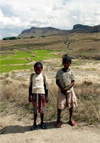|
|
Despite violent protests that have left more than 100 dead and led to the ouster of a democratically-elected president, Daewoo Logistics Corp. continues to hold 218,000 hectares of cropland in Madagascar, according to a new campaign by Rainforest Rescue.
Last year Daewoo, a South Korean firm, signed a 99-year lease to 1.3 million hectares of agricultural land in Madagascar, roughly half the island nation’s arable land. The agreement, signed by the President Marc Ravalomanana, was widely condemned and sparked an uprising that eventually led to a military coup by Andry Rajoelina, the 34-year-old mayor of Madagascar’s capital. Shortly after taking control one of Rajoelina’s first measures was to repeal the Daewoo deal.
But now Rainforest Rescue reveals that the Daewoo deal may not be as dead as previosly reported, with Daewoo continuing to “surreptitiously hold some 218,000 hectares of appropriated land.”
The original deal
As reported last year, Daewoo originally planned to plant corn on 1 million hectares in the arid western part of the island and 300,000 ha (740,000 acres) of oil palm on land in the tropical east, a region that is home to the bulk of Madagascar’s rare rainforests. The company would produce the food for export and import workers from South Africa.
The deal was criticized on the grounds that it failed to recognize customary land use by local people and threatened to consume vast areas of cropland in a country that can barely produced enough food to feed itself. Most Malagasy — as the people of Madagascar are known — live on less than a dollar per day and nearly half of the country’s children under five years of age are malnourished.
Conservation success in Madagascar proves illusory in crisis

(06/12/2009) Despite the popularity he enjoyed abroad, domestic support for ousted president Marc Ravalomanana eroded rather quickly last February when he went head to head with Andry Rajoelina, the rookie mayor of Madagascar’s capital. Rajoelina rallied disparate opposition groups to the cause and soon toppled the incumbent to become, at his own proclamation, President of the “High Authority of Transition.” For the country as a whole, the results have not been encouraging. The tourism industry has shriveled to a shadow of itself, important donors have suspended non-humanitarian aid, and a power vacuum has set in in remote regions of the island, wreaking havoc on some of its most fragile and prized ecosystems.
International community calls for action against gangs’ illegal logging in Madagascar
(06/08/2009) Six nations and three conservation organizations have issued a statement calling for action against illegal logging in Madagascar’s protected areas.